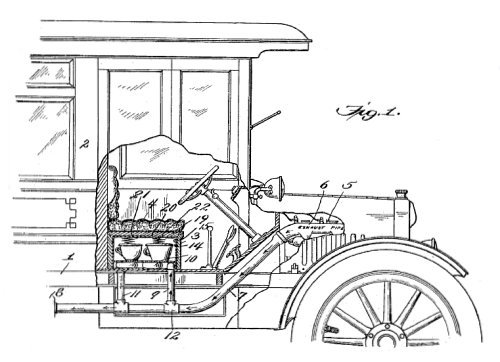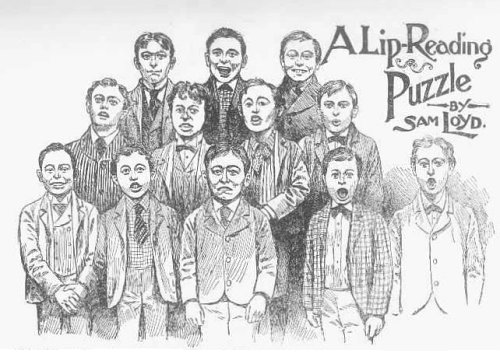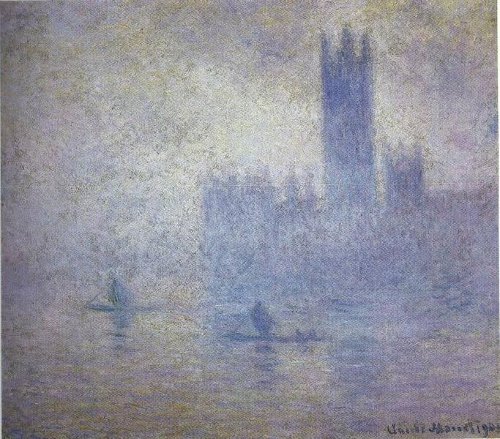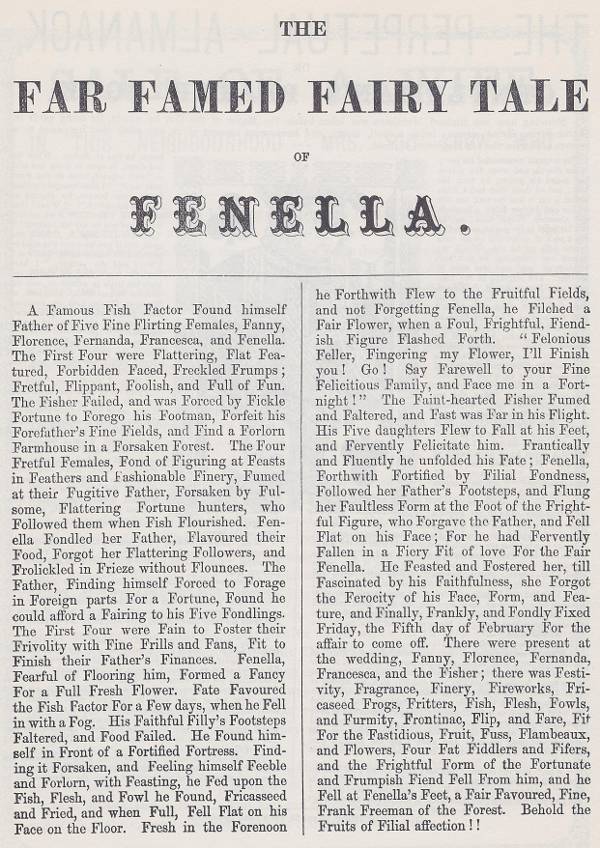
Discovered by J.A.H. Hunter.

Discovered by J.A.H. Hunter.

Robert Martin offered a novel addition to the automobile in 1919: a stove. His invention would direct hot gases from the engine to a cooking chamber in the passenger compartment, where they could warm food even while the car was in transit. The stove’s lid is fitted with compression springs to prevent your casserole dish from rattling on the way to grandmother’s house.
Martin promises that the heating coil is sealed, so there’s no danger of contaminating the food by “the poisonous and injurious constituents of the exhaust gases” or of “smutting or blackening the cooking vessels by the soot.” So don’t worry about that.
Surprisingly natural palindromes:
E.L. Fletcher proposed a telephone conversation:
“No! … Too bad! … Ah! I was never, ever, even tired! … Now, is Eire very sordid? … Oh! Won’t I? … Did I? … Was I not up, spot on? … I saw no shell! … I saw it! … I did! I? … Fired? … No wonder! … It saw dad was well left … I sat, rapt! … I did? … Won’t i? … No! … Red? … No! … Prevent it? … Never! … Ponder on it now! … Did it part as it fell? … Lew saw dad was tired … No wonder, if i did it! … I was ill, eh, son? … Was i? … No tops put on, I saw … I did it? … No? … Who did? … Rosy reveries? I wonder! … It never, ever, even saw I had a boot on! …”

Here is a class of a dozen boys, who, being called up to give their names were photographed by the instantaneous process just as each one was commencing to pronounce his own name. The twelve names were Oom, Alden, Eastman, Alfred, Arthur, Luke, Fletcher, Matthew, Theodore, Richard, Shirmer, and Hisswald. Now it would not seem possible to be able to give the correct name to each of the twelve boys, but if you practice the list over to each one, you will find it not a difficult task to locate the proper name for every one of the boys.
UPDATE: The first item here is incorrect. The dates coincide only if one uses the Gregorian calendar to date Galileo’s death and the Julian to date Newton’s birth. The two events occurred 361 days apart, which puts them in separate years on both calendars. Apparently this is a very common error. (Thanks, Igor.)

No sun — no moon!
No morn — no noon —
No dawn — no dusk — no proper time of day —
No sky — no earthly view —
No distance looking blue —
No road — no street — no “t’other side the way ” —
No end to any Row —
No indications where the Crescents go —
No top to any steeple —
No recognitions of familiar people —
No courtesies for showing ’em —
No knowing ’em!
No travelling at all — no locomotion,
No inkling of the way — no notion —
“No go” — by land or ocean —
No mail — no post —
No news from any foreign coast —
No park — no ring — no afternoon gentility —
No company — no nobility —
No warmth, no cheerfulness, no healthful ease,
No comfortable feel in any member —
No shade, no shine, no butterflies, no bees,
No fruits, no flowers, no leaves, no birds,
November!
— Thomas Hood, in The Book of Days, 1832
Willard Fiske in the Chess Monthly, 1857:
Cherished chess! The charms of thy checkered chambers chain me changelessly. Chaplains have chanted thy charming choiceness; chieftains have changed the chariot and the chase for the chaster chivalry of the chess-board, and the cheerier charge of the chess-knights. Chaste-eyed Caissa! For thee are the chaplets of chainless charity and the chalice of childlike cheerfulness. No chilling churl, no cheating chafferer, no chattering changeling, no chanting charlatan, can be thy champion; the chivalrous, the charitable, and the cheerful, are the chosen ones thou cherishest. Chance cannot change thee: from the cradle of childhood to the charnel-house, from our first childish chirpings to the chills of the church-yard, thou art our cheery, changeless chieftainess. Chastener of the churlish, chider of the changeable, cherisher of the chagrined, the chapter of thy chiliad of charms should be chanted by cherubic chimes, and chiseled on chalcedon in cherubic chirography.
In 1974, Judge H. Sol Clark of the Georgia Court of Appeals rendered judgment thus in Banks vs. State:
“Literary license allows an avid alliterationist authority to postulate parenthetically that the predominating principles presented here may be summarized thusly: Preventing public pollution permits promiscuous perusal of personality but persistent perspicacious patron persuasively provided pertinent perdurable preponderating presumption precedent preventing prison.”
An English broadside from C. Hindley’s Curiosities of Street Literature (1871):


“The popular mind often pictures gigantic flying machines speeding across the Atlantic and carrying innumerable passengers. … It seems safe to say that such ideas are wholly visionary.” — Harvard College Observatory astronomer William Henry Pickering, 1908

When the last Impression is posted and the tubes are twisted and pinched,
When the youngest Cubist is throttled and the oldest Futurist lynched,
We shall rest, and, gee! we shall need it–come off for a minute or two,
Till the masters of all this rubbish shall set us agog anew.
Then those that were Cubists shall worry; they shall sit on a picket fence
And paint with a vacuum cleaner on the sides of canvas tents.
They shall have real models to draw from–a nude in a crazy quilt,
Or a maudlin, rhomboid Scotchman, descending the stairs in his kilt.
And only Picasso shall praise them, and only Matisse shall blame;
And no one shall care for censure, and no one shall care for shame.
But each in his own straitjacket and each in his separate cell
Shall slather the paint as he sees it, for the glory of Art that won’t jell.
— Carolyn Wells, in Such Nonsense!: An Anthology, 1918